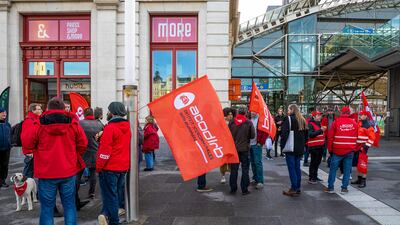Belgian trains, schools, supermarkets and airports ground to a halt on Wednesday as the country’s main trade unions joined forces to call for higher wages and a cap on energy prices.
The strike was largely followed at the country’s three maritime ports. Schools, nurseries and post offices were also affected. Large retailers such as Carrefour, Delhaize and Lidl were mostly closed.
Most train and public urban traffic was reduced to a minimum. Local media reported light traffic on roads as people stayed at home during the strike, the third in four months.
Brussels airport had pre-emptively cancelled 60 per cent of flights. Local media reported that planned flights were able to operate normally.
In Brussels, the capital city hosting most of the European Union institutions, only one metro line was in service, with buses and tramways also disrupted.
Staff in about two thirds of hospitals in the French-speaking Wallonia region and Brussels joined the fray, with non-urgent appointments and operations postponed, the CSC union said.
Inflation has hit its highest point in the country of 11.5 million since 1975, at 12.27 per cent in October. This has been in large part caused by high energy costs triggered by the war in Ukraine, and Europe’s brutal decoupling from Russian pipeline gas.
The government has announced a support package of €135 ($135) in aid for gas and €61 for electricity from November to March.
But people are increasingly worried about end of the month bills and at the same time, energy companies’ profits are soaring, trade union representative Yves Helendorff of the National Centre of Employees told local TV.
“The government is not going to get everything it could to help people and workers overcome this crisis,” he said.
In Brussels, a simulation for a new electricity and heating subscription for a two-person flat indicated a cost of more than €250 a month on Tuesday.
Unions are insistent that workers have to be shielded from the impact of the price hikes that leave many on the edge of poverty.
“Prices of electricity, gas, food have gone through the roof over the past year. Because of the war but also because companies seized the opportunity to increase profits even more,” said Christian Democrat trade union ACV. “In contrast, wages are not allowed to increase for years … This has to stop. We need a price cap on gas and electricity.”
Belgian Prime Minister Alexander De Croo has called on the European Union to cap gas prices but disagreements among EU countries over the technical implications of such a cap have delayed decision making.
The country’s four biggest banks — ING Belgique, BNPP Fortis, Belfius and KBC — expect the Belgian economy to enter a recession this winter. This would be the third time in 20 years that Belgium has suffered a recession, according to Belgian daily Le Soir.
A country is generally thought to be in a recession when its economy contracts two quarters in a row. The four banks anticipate a contraction of 0,4 per cent in the fourth quarter after a contraction of 0.1 per cent in the third quarter.
Belgium has set up a system of wage indexation guaranteeing that if the cost of living goes up, salaries, pensions and benefits also increase.
But unions have been arguing that the next indexation — which will not take place before January for hundreds thousands of workers — does not take into account higher fuel prices specifically, so there is always a loss in purchasing power.
Agencies contributed to this report


